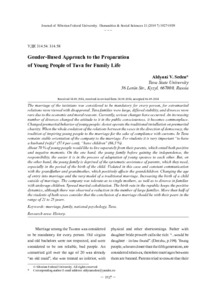Gender-Based Approach to the Preparation of Young People of Tuva for Family Life
Скачать файл:
URI (для ссылок/цитирований):
https://elib.sfu-kras.ru/handle/2311/16516Автор:
Seden, Aldynai V.
Седен, А.В.
Дата:
2014-11Аннотация:
The marriage of the tuvinians was considered to be mandatory for every person, for extramarital
relations were viewed with disapproval. Tuva families were large, differed stability, and divorces were
rare due to the economic and moral reasons. Currently, serious changes have occurred. An increasing
number of divorces changed the attitude to it in the public consciousness, it becomes commonplace.
Changed premarital behavior of young people: do not operate the traditional installation on premarital
chastity. When the whole evolution of the relations between the sexes in the direction of democracy, the
tradition of inspiring young people to the marriage for the sake of compliance with customs. In Tuva
remains stable orientation of the company to the marriage. For students it is very important “to have
a husband (wife)” (57.4 per cent), “have children” (86,3 %).
About 70 % of young people would like to live separately from their parents, which entail both positive
and negative moments. On the one hand, the young family before gaining the independence, the
responsibility, the easier it is in the process of adaptation of young spouses to each other. But, on
the other hand, the young family is deprived of the systematic assistance of parents, which they need,
especially in the period of the birth of the child. Violated in this case and constant communication
with the grandfather and grandmother, which positively affects the grandchildren. Changing the age
of entry into marriage and the very model of a traditional marriage. Increasing the birth of a child
outside of marriage. The company was tolerate as to single mothers, as well as to divorce in families
with underage children. Spread marital cohabitation. The birth rate in the republic keeps the positive
dynamics, although there was observed a reduction in the number of large families. More than half of
the students of both sexes consider that the conclusion of a marriage should be with their peers in the
range of 21 to 25 years Тувинцы считали брак обязательным для каждого человека, внебрачные отношения
не одобрялись. В Туве традиционно семьи были большими, разводы были редки по
экономическим и моральным причинам. В настоящее время происходят серьезные
изменения. Наблюдается все большее число разводов, изменилось и отношение к ним – в
общественном сознании это воспринимается как обычное явление. Меняется добрачное
поведение молодежи: не работают традиционные установки на добрачное целомудрие.
Когда вся эволюция отношений между полами движется в направлении демократии,
традиции вдохновляют молодых людей на брак ради соблюдения обычаев. В Туве остается
стабильной ориентация на брак; для студентов очень важно “иметь мужа (жену )”
(57,4 %) , “иметь детей” ( 86,3 %). Около 70 % молодых людей хотели бы жить отдельно
от родителей, что влечет за собой как положительные, так и отрицательные моменты.
С одной стороны, молодая семья самостоятельно несет ответственность за брак, легче
проходят процессы адаптации молодых супругов друг к другу. Но, с другой стороны,
молодая семья лишается систематической помощи родителей, в которой они нуждаются,
особенно в период рождения ребенка. Нарушаются в этом случае и постоянные связи
с дедушками и бабушками, что не лучшим образом сказывается на воспитании внуков.
Наблюдается изменение возраста вступления в брак и самой модели традиционного брака.
Участились случаи рождения детей вне брака. Распространено семейное сожительство.
Рождаемость в республике продолжает положительную динамику, хотя наблюдается
сокращение числа многодетных семей. Более половины студентов обоих полов считают,
что заключать брак нужно со своими сверстниками в возрасте от 21 до 25 лет

